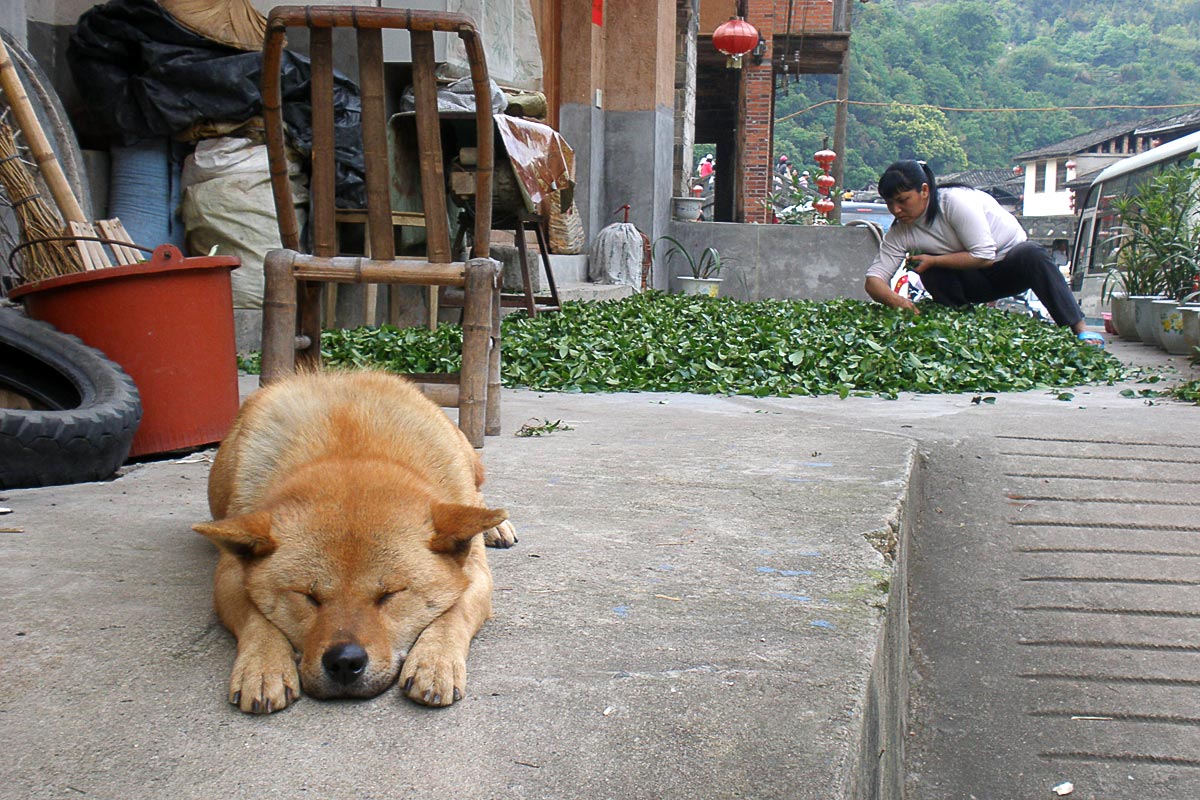
Take it as it comes
Specialize in having fun
—The Doors
Having followed our new friends, the members of the Chinese Taipei Triathlete Association, to lunch inside the Fujian tulou complex at Tianluokeng, Masayo and I got motorbike rides eight kilometers down to a little community called Taxiacun (塔下村). We checked into the same little hotel they were staying at and then explored Taxiacun with them.
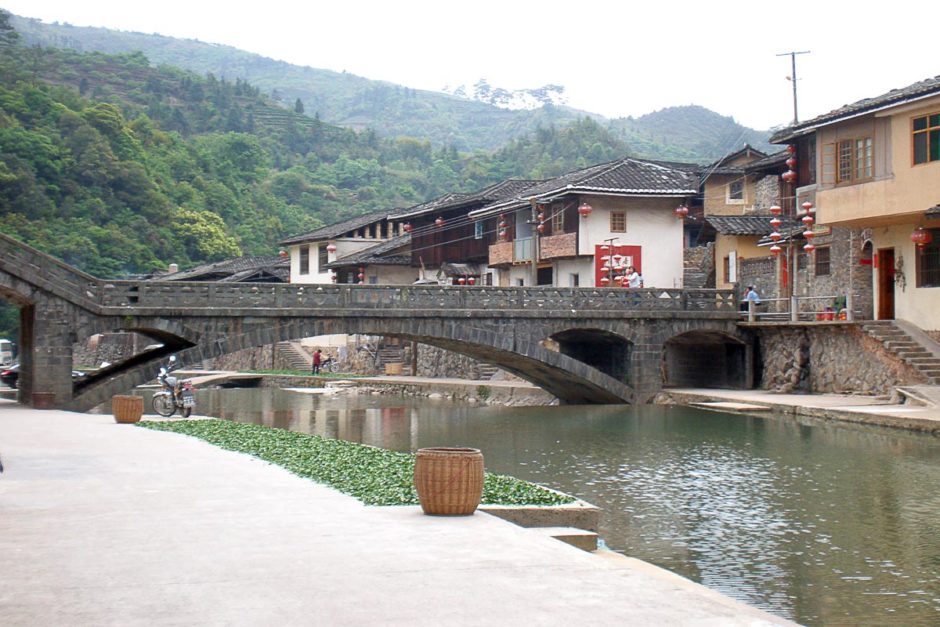
Around Taxiacun
The young owner of the guesthouse took us all to a nearby hilltop from where we could look down over Taxiacun: its one street (Highway 309, looking less like a highway and more like concrete slabs where townspeople could dry their freshly-picked tea leaves in the sun), cut in two by the burbling creek that ran through town; the two or three big tulou that Taxiacun claimed for its own that were surrounded by the town’s regular smaller square structures; the endless and lovely green hillsides that extended in every direction.
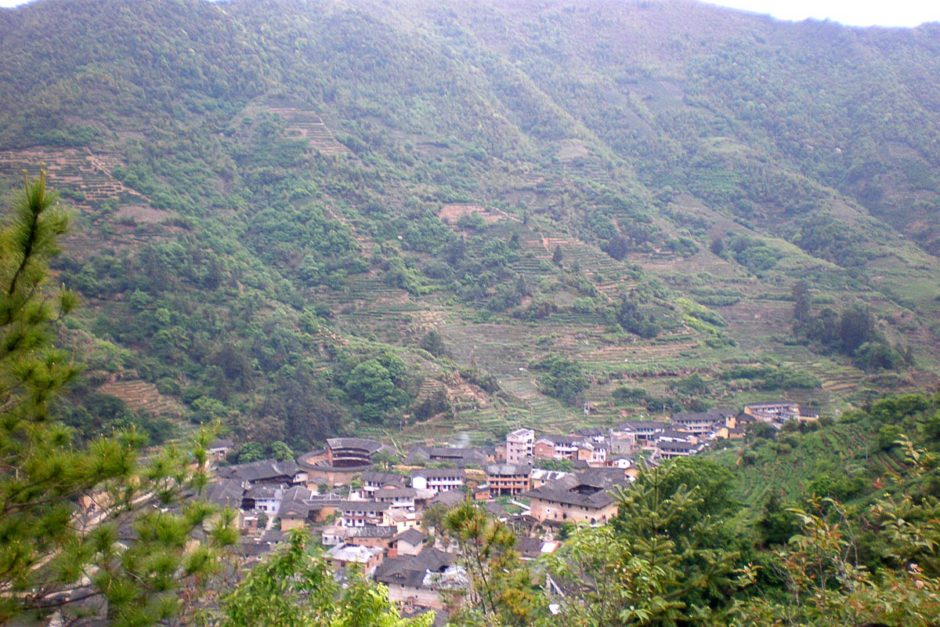
With few people walking around, and even fewer cars and almost no noise, Taxiacun was like something from another era. But it still buzzed with life – just in an ancient, well-worn setting.
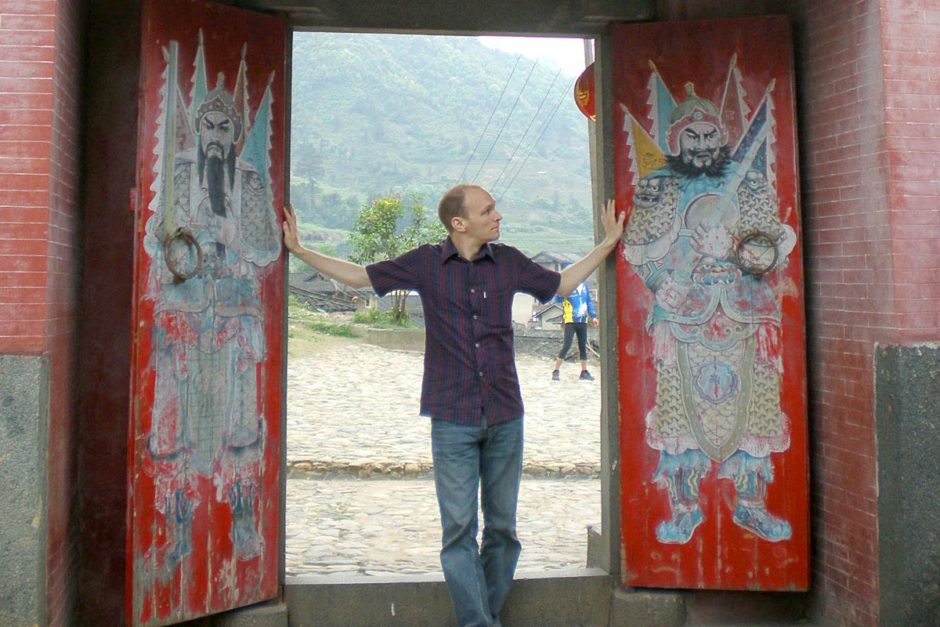
Deyuan Temple
On one edge of Taxiacun is a temple called Deyuan (德远堂). In its quiet mountain setting and with its old peeling paint and mysterious decorations, Deyuan looks like it’s as old as China is. The ramshackle, weathered wood used to be painted red; now it flakes off and only half of the original paint remains on some surfaces.
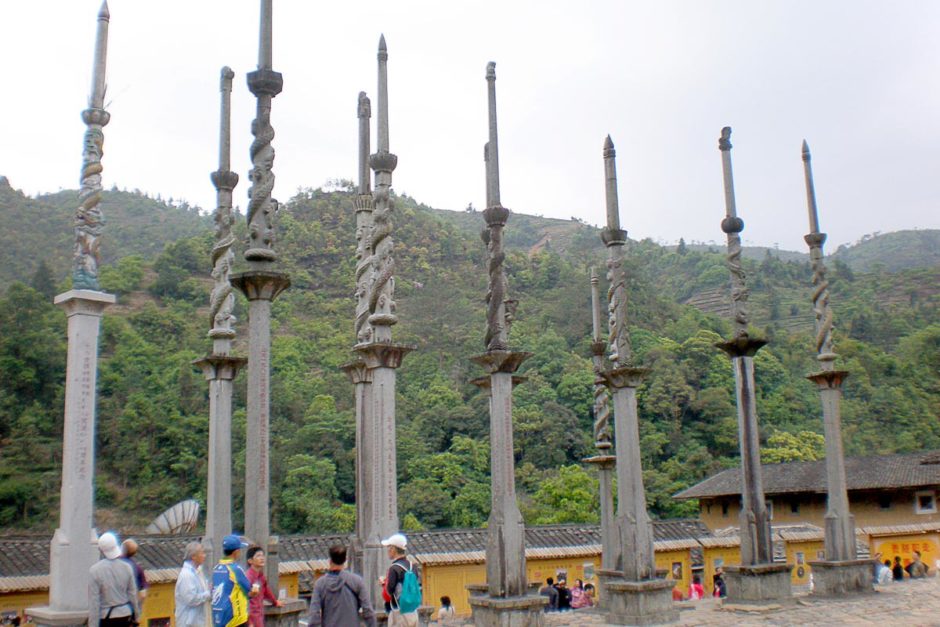
Pillars at Deyuan Temple.
Colorful but faded figures guard a gate that leads to the central part of the small Deyuan Temple, and past the ornately-carved wooden pieces is a copper-colored metal sheet behind a panes of glass. It’s full of impossible-to-read Chinese characters, etched in neat, orderly little rows. Lists of people perhaps – a record of ancient Taxiacun. One of the triathletes explained that Deyuan is one of a small number of temples that wasn’t destroyed by the Communist Chinese Army.
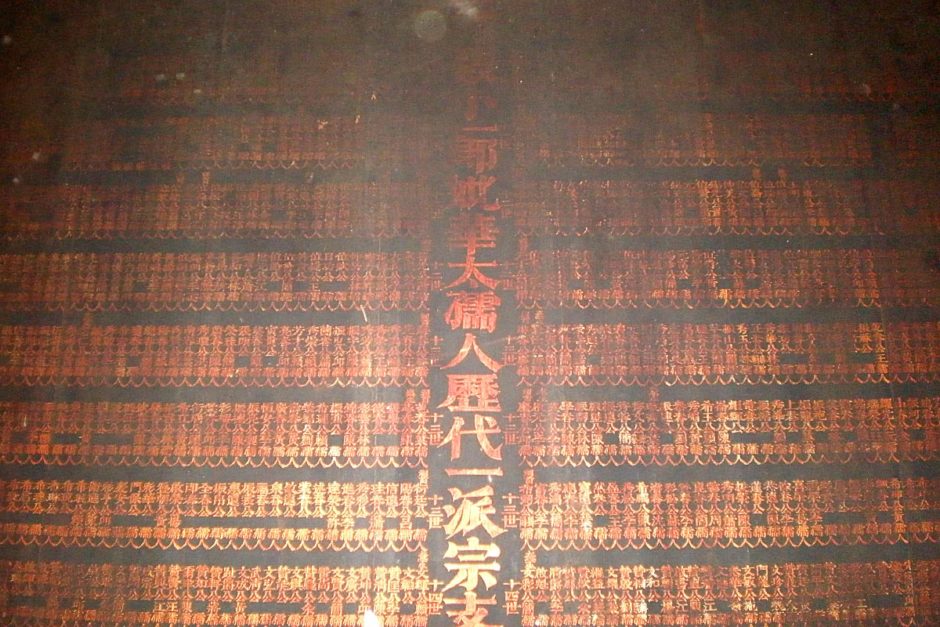
We visit a local family
Afterwards we split off from the Taiwanese triathletes and did some exploring of some of Taxiacun’s few back alleys on our own. Walking on stone paths and under arches between cramped houses, we stopped to gawp at some white geese in pens, and suddenly a young woman approached us.
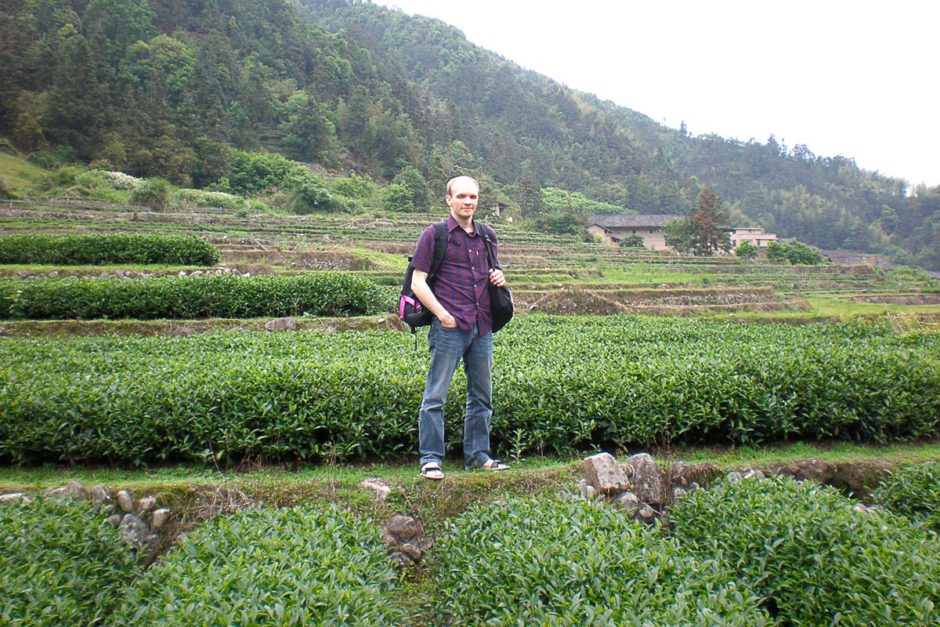
She was a university student (somewhere, not here in Taxiacun!) and spoke English. She asked a little about where we were from and how we’d ended up in Taxiacun, then asked if we’d like to go visit her and her grandparents’ home.
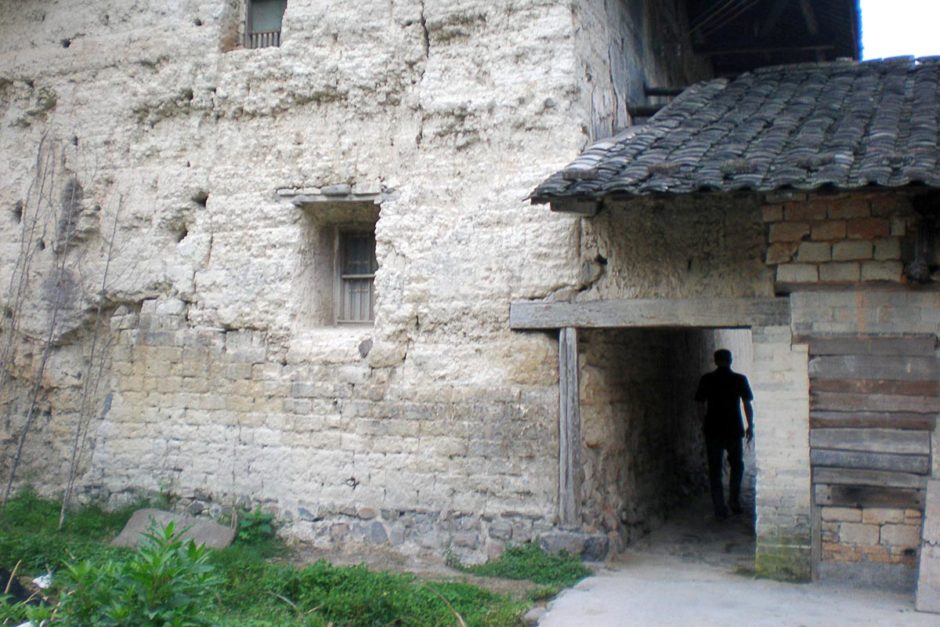
This was a great opportunity to see local Chinese life, something most tourists would never get to do. The girl was visibly disappointed – or maybe it was just surprise – that we spoke no Chinese, but we happily accepted her invitation.
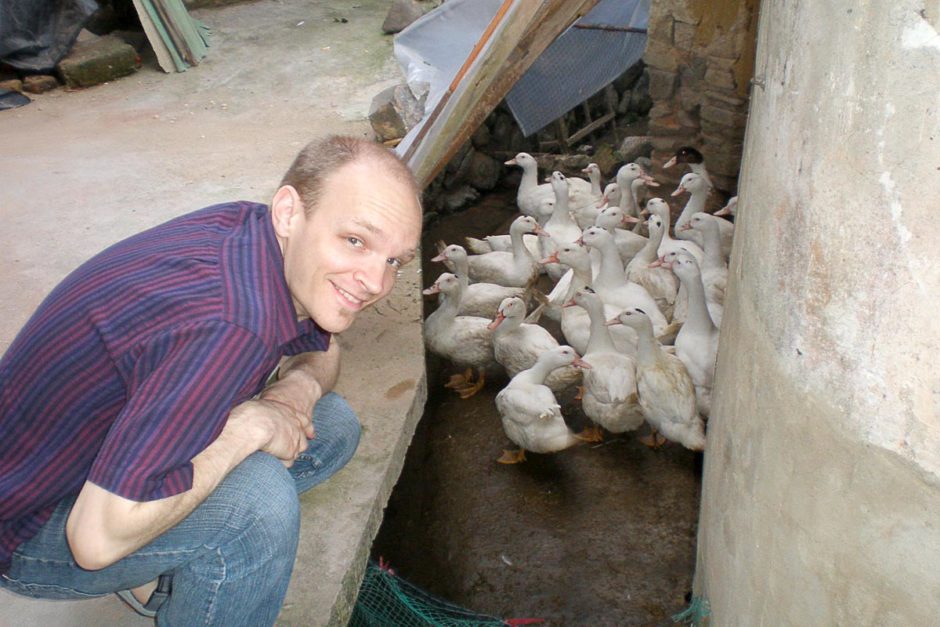
We went to her house, took off our shoes, and sat in a front room on small couches with her and her smiling grandparents, all sipping tea while the hills offered nothing but benevolent silence outside. She translated for us, and we chatted about their life and about ours. We explained where we’d been so far in China, and they explained about the tea-growing culture of Taxiacun and the surrounding mountains.
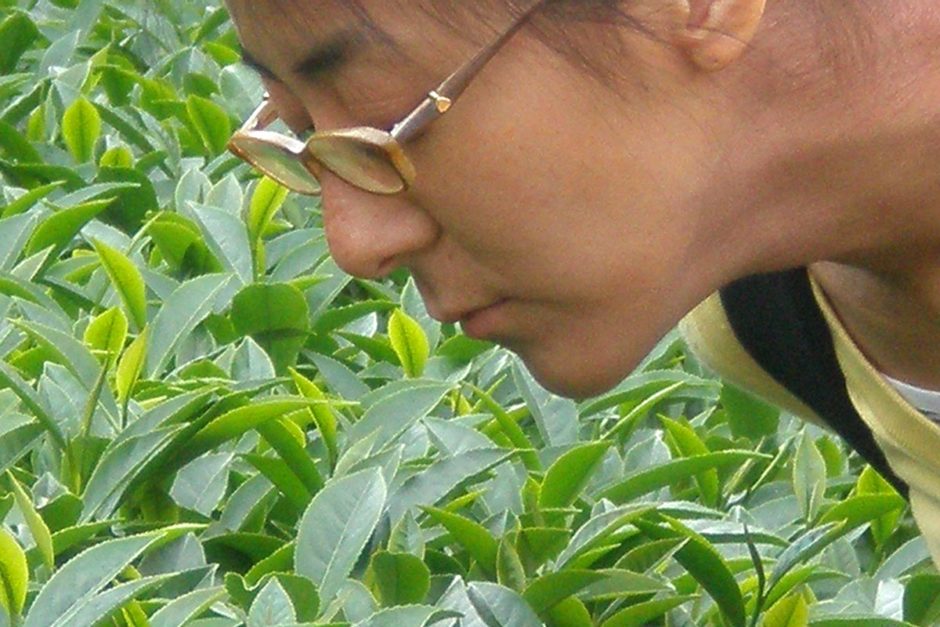
After a little while, we stood up to go. They insisted on giving us some homemade green tea cake to take with us, and I asked if we could get a photo of all of us. I put my camera on top of their big old TV set, set the timer, and got a snap of this surprising and friendly brush with local mountain life.
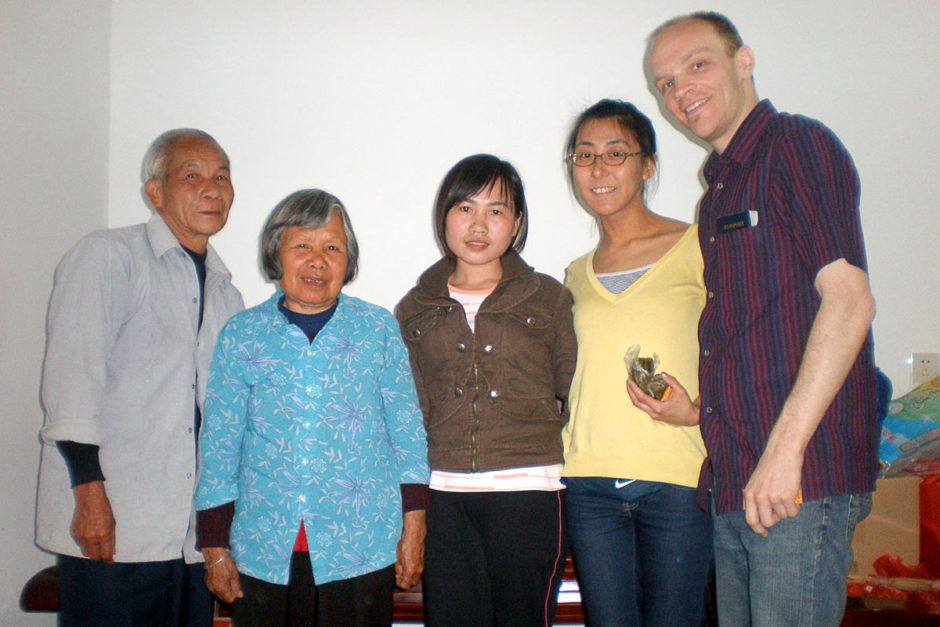
It was one of the more remarkable experiences Masayo and I have had traveling, anywhere. And the sequence of events that led us here – the ill-planned bus ride from Xiamen on the coast, the chance meeting of the Taiwanese travelers who suggested their hotel for us, the decision to go walk around the darkening late-afternoon alleys of this tiny village, and the fact that an English-speaking student just happened to be passing by (we’d hardly seen anyone else)… only by such effort and luck does one get experiences like this.
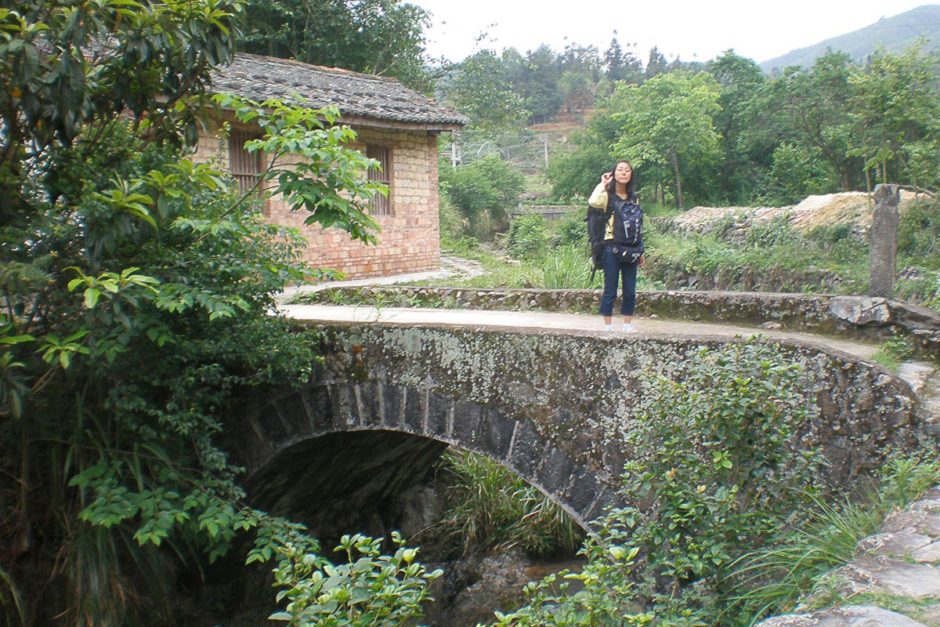
Dinner with the triathletes
That night, with no dinner plans, the Taiwanese travelers yet again invited us to eat with them – the second time today. They had set up a table from a restaurant on a bridge over the creek in town, and the restaurant served us an assortment of local food. More good times with the kindest people in the world. It was an excellent dinner, and our companions (even the ones that spoke no English, which was most of them) were equally excellent.
Diabetes report – Blood sugar after the bridge dinner
Although taking my insulin for dinner wasn’t hard – I just waited for a moment when most of my eating companions had gotten up from the table to check out the progress of the food, turned away, and shot up into my stomach – the dosage was difficult to calculate.
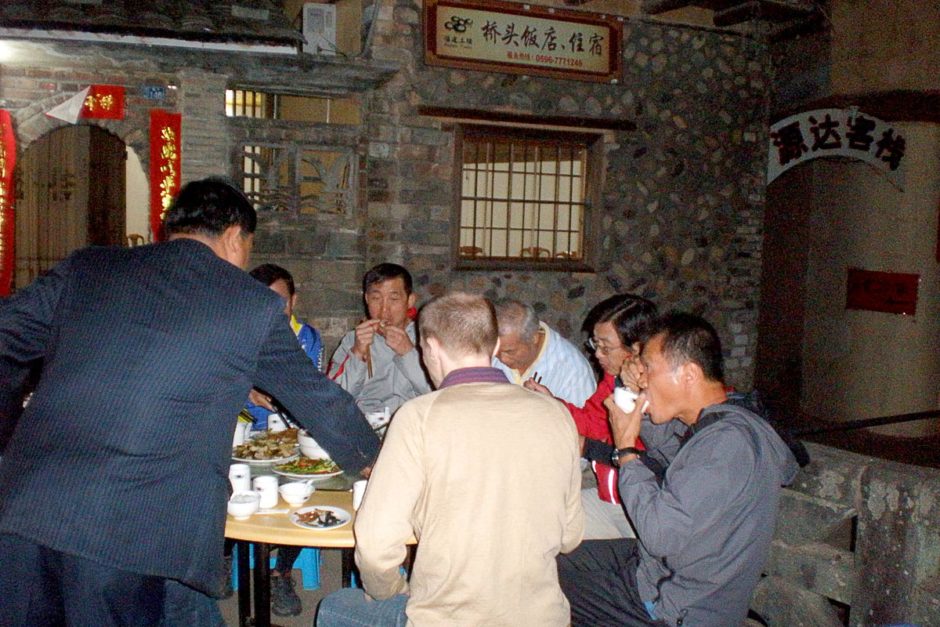
The meal consisted of lots of vegetables and meat, but also rice, noodles, sauces, and shrimp crackers. I ended up high afterwards, but wasn’t too surprised by it. In retrospect, I should have realized I’d be hungry after the day’s exertions and taken more insulin. But I checked after dinner and took a corrective shot, so it wasn’t too bad for too long.
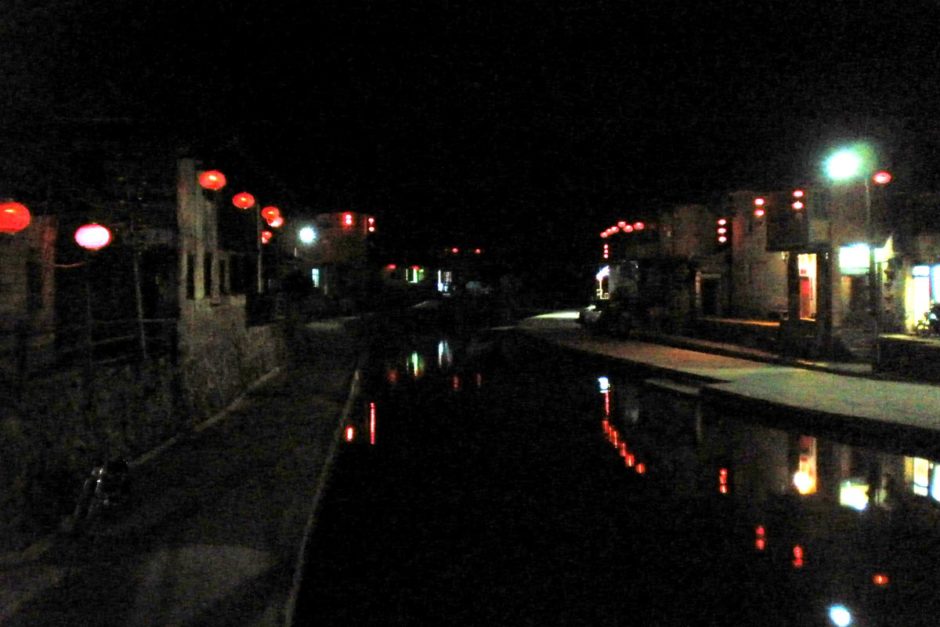
Our view during dinner.
The stranger the dinner situation, the tougher the insulin choice can be. But, while I didn’t like being high, the adventure of being here and having a varied and delicious local mountain dinner on a stone bridge in the cool night air of a Chinese village made it more than worth it.
Diabetes doesn’t always behave, but it shouldn’t keep you from doing whatever you want to do.
Extra day in Taxiacun, alone
We awoke the next day to say goodbye to the triathletes, who were moving on to their next adventure together. We got one last photo of all of us together and waved a fond goodbye to them. The two that spoke English best gave me their business cards – one a President, one a Director of the Association. And they took off – and we were left in Taxiacun where we decided to stay another night. (One thing that influenced this decision was my delight that the internet connection was lightning fast, even up in our room. Who’da thunk it, way out here in the rural Chinese hills?)
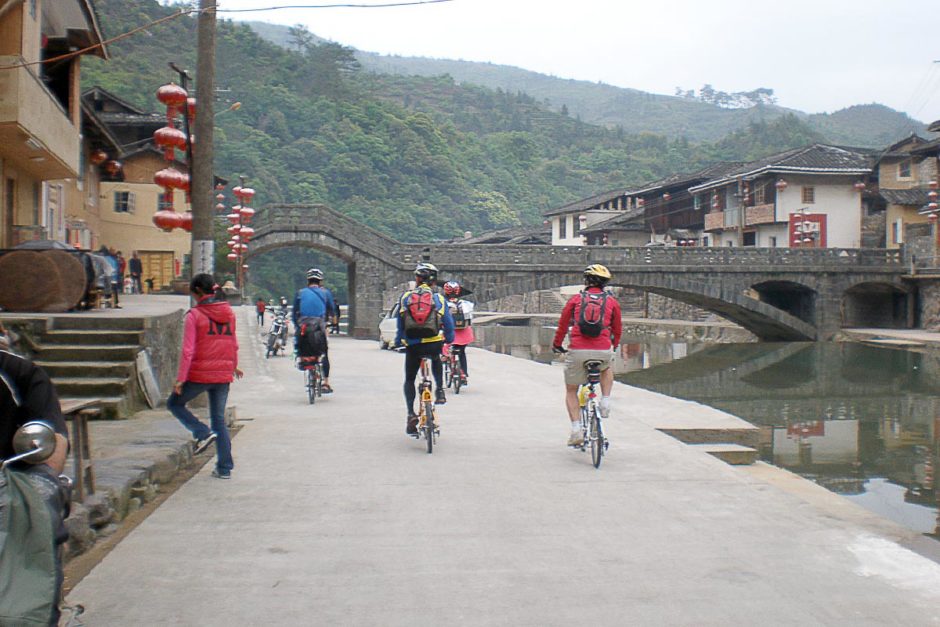
The Taiwanese triathletes ride out of Taxiacun.
Masayo and I spent the day walking around town, hiking up to some tea plants on hills behind the row of houses and looking at some of the old stone buildings across the creek. We checked out a couple of the tulou in town, with their big round interiors, wavering wooden slats holding up their several floors, and chickens strutting around below.
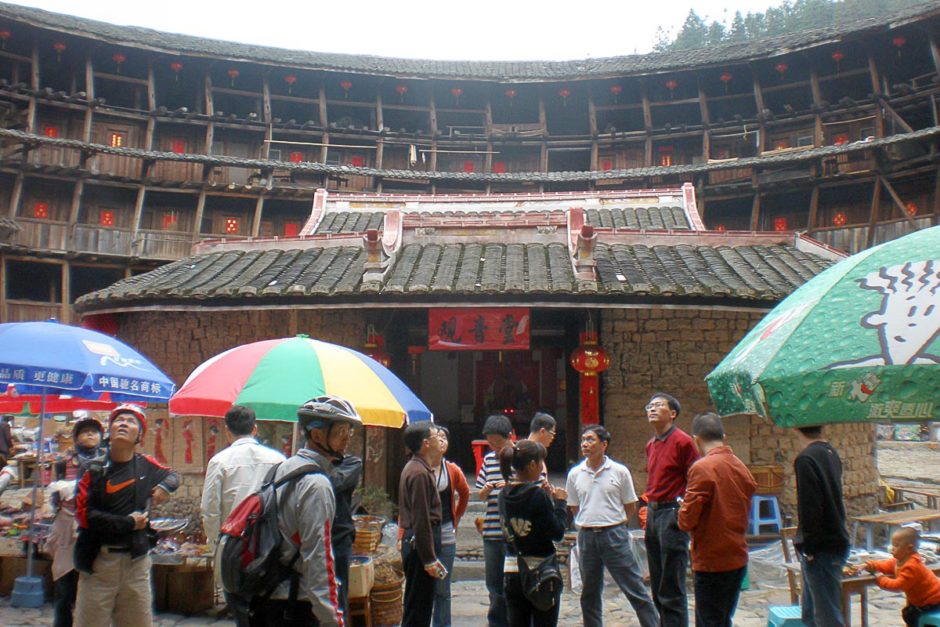
Tea ceremony
That evening the owner of the hotel and his wife invited us to have tea with them. Actually, even the invitation took a while: as they spoke not a single word of English, the guy finally hit upon the idea of typing single words into a translation program on his computer, which was hooked up to speakers. We were the only guests this night.
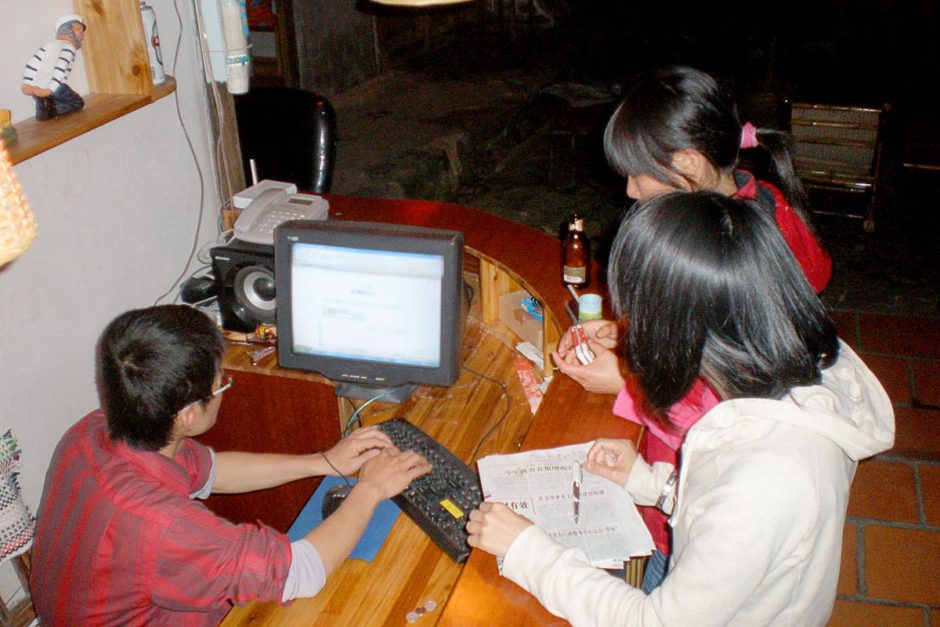
Communicating by online translation.
From the speakers a computerized voice would say English words out of context – “together”, “drink”. Eventually we understood, and the four of us laughed every time something was successfully communicated. It was slow, but we carried on a conversation, such as it was.
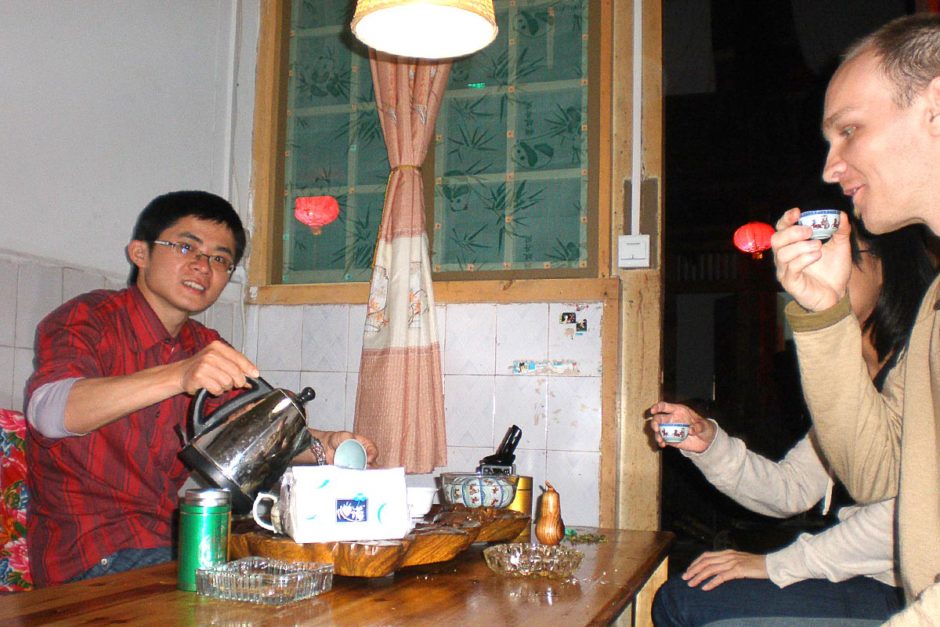
In a little side room we all sat and the couple brought out a lovely tea set on a large wooden tray. Into tiny cups they poured tea, and we toasted to vague things and smiled and sipped. It may have been stressful for them, to deal with visitors who spoke no Chinese and didn’t know much about tea culture, but they insisted on going out of their way to accommodate us and show us their hospitality. We were very impressed – it’s a lucky traveler who is taken in so unreservedly like this in such an out-of-the-way place.
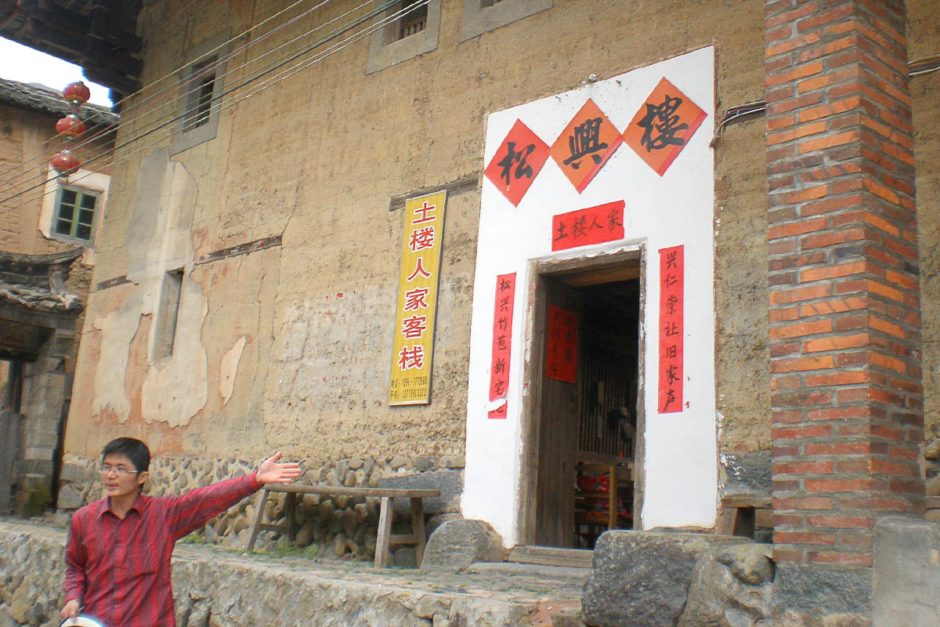
One of the hotel owners in front of the hotel.
Farewell to Taxiacun forever
The next morning we checked out ourselves. Having worked out the bus schedule the night before with the help of the owners’ computer voice (“bus”, “eleven”), we knew when we had to be back up the mountain at the bus stop that we’d ridden to two days ago.
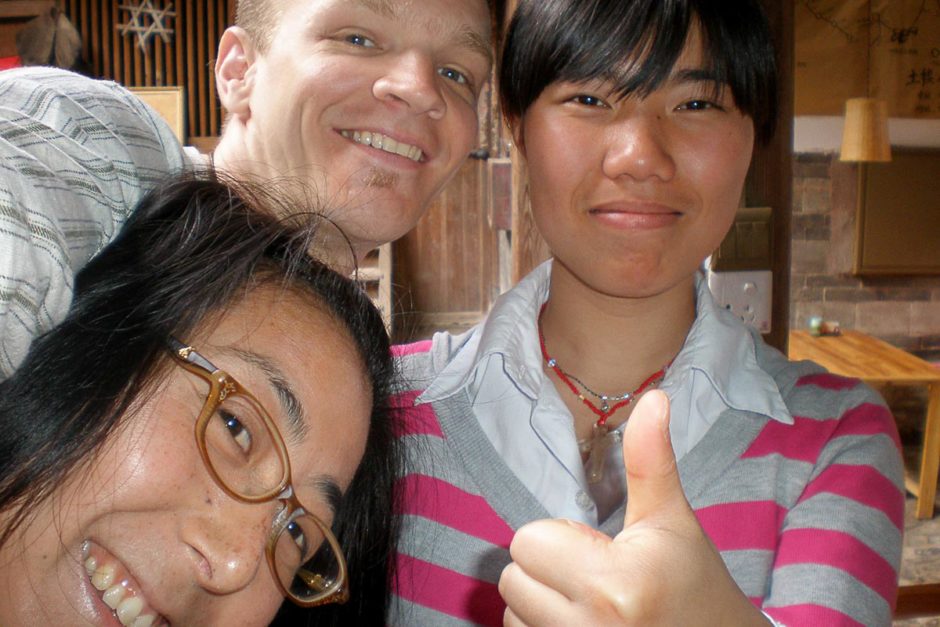
Masayo and I with one of the hotel owners.
The hotel owner took us there on his motorbike – one at a time, so he had to go and return twice. Yet again we were a burden for our hosts, but yet again they helped us out.
And with that, we left the obscure mountain village of Taxiacun and the area of the famous Fujian tulou roundhouses, heading back to Xiamen on the coast by bus. Our time in the village couldn’t have been more absorbing and comfortable. We saw a part of China and met people that even travelers who get this far don’t often see. We were very lucky, and we owed it all to traveling.
What’s a super-obscure and beautiful place you’ve visited?
Thanks for reading. Suggested:
- Share:
- Read next: Day 51: Overnight stay in Zhuzhou, a town I can't remember
- News: Newsletter (posted for free on Patreon every week)
- Support: Patreon (watch extended, ad-free videos and get other perks)

Support independent travel content
You can support my work via Patreon. Get early links to new videos, shout-outs in my videos, and other perks for as little as $1/month.
Your support helps me make more videos and bring you travels from interesting and lesser-known places. Join us! See details, perks, and support tiers at patreon.com/t1dwanderer. Thanks!
